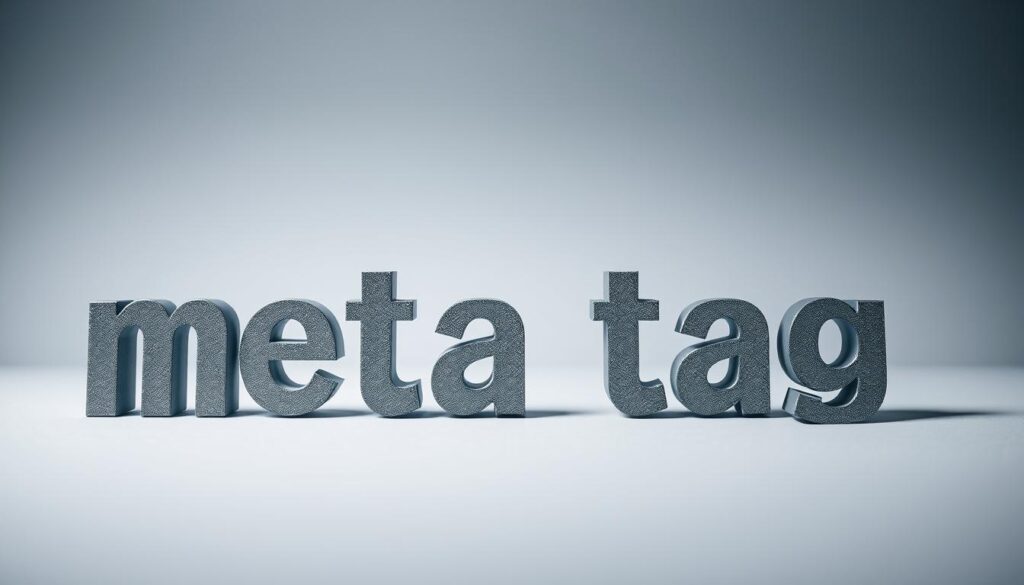When it comes to search engine optimization (SEO), the little things matter a lot. One key element is the meta tag. Writing great page titles and SEO titles is vital for SEO success. The title tag is often the first thing users see in search results.
Optimizing your meta tags can greatly affect your search rankings and how many people click on your site. By following meta tag best practices and using SEO meta tag tips, you can make your site more visible. This can lead to more visitors. Need help with your SEO? Connect with us via WhatsApp Call or Chat.
Key Takeaways
- Optimize your meta tags to improve search engine rankings.
- Use relevant keywords in your meta tags.
- Keep your meta tags concise and descriptive.
- Test and refine your meta tags regularly.
- Improve user click-through rates with well-crafted meta tags.
Understanding the Importance of Meta Tags
Meta tags connect your webpage to search engines. They share important details that affect how your site is indexed and shown in search results. Knowing their role is key to boosting your website’s SEO.
What Are Meta Tags?
Meta tags are short pieces of text that give search engines info about your webpage. The title tag and meta description are most important for SEO. They decide how your page looks in search engine results.
Key Components of Meta Tags:
- Title Tag: The title of your webpage, shown as the headline in SERPs.
- Meta Description: A short summary of your webpage’s content, below the title in SERPs.
- Keyword Tags: Though less important today, they’re part of some SEO plans.
How Meta Tags Influence SEO
Meta tags greatly affect SEO by helping search engines grasp your webpage’s content. Good meta tag keyword research is vital. It helps create tags that attract your audience and boost your site’s visibility. For more on meta tags, check out Semrush’s blog on meta tags.
| Meta Tag | Influence on SEO | Best Practice |
|---|---|---|
| Title Tag | Directly affects search engine rankings and click-through rates. | Include primary keywords, keep it concise. |
| Meta Description | Influences click-through rates by providing a compelling summary. | Craft a compelling call-to-action, within character limits. |
The Role of Click-Through Rates
Click-through rates (CTRs) are critical in SEO. They show if your webpage is relevant and appealing. A good meta description can boost CTRs by making users want to visit your site.
Improving CTRs through Meta Tags:
- Use compelling language in your meta descriptions to attract users.
- Ensure your title tags are descriptive and include relevant keywords.
- Test different variations to optimize performance.
Crafting Compelling Meta Titles
To grab users’ attention and boost SEO, make your meta titles informative and engaging. Your meta title is key in search engine results. It summarizes your page’s content and helps users decide if they want to click on your link.

Using Keywords Effectively
Putting relevant keywords in your meta title is key for SEO success. Place your target keyword at the start of the title. This helps search engines understand your page and boosts your ranking in search results.
Here are some tips for using keywords well in your meta titles:
- Do thorough keyword research to find the best terms for your content.
- Use a mix of primary and secondary keywords for a complete title.
- Avoid keyword stuffing by making sure your title is natural and descriptive.
Keeping It Concise and Engaging
It’s important to include keywords but also keep your meta title short and engaging. Most search engines cut off titles over 60 characters. So, aim for a title that’s both informative and catchy within this limit.
To do this, consider these strategies:
- Focus on your page’s main topic and condense it into a few key words.
- Use action-oriented language or questions to grab users’ interest.
- Make sure your title accurately reflects your page’s content to avoid misleading users.
By balancing keywords with conciseness and engagement, you can make meta titles that improve your SEO and attract more clicks.
Writing Effective Meta Descriptions
Meta descriptions are key to summarizing your webpage’s content and drawing users in. A well-written meta description can boost your click-through rates and make your webpage more visible in search results.
Crafting a Call to Action
To make your meta descriptions better, include a clear call to action. Use language that encourages users to visit your webpage. Phrases like “Learn more,” “Discover how,” or “Get started today” can prompt users to click.
Make sure your call to action fits the content on your webpage. This improves user experience and lowers bounce rates. By matching your meta description with your content and adding a compelling call to action, you’ll make your meta tags more effective.
Maintaining Character Limits
Search engines often cut off meta descriptions that are too long. To avoid this, keep your meta description under 155-160 characters. This way, your entire description is visible to users, helping them understand your webpage’s content.

| Characteristics | Effective Meta Description | Ineffective Meta Description |
|---|---|---|
| Length | Within 155-160 characters | Exceeds 160 characters |
| Call to Action | Includes a clear call to action (e.g., “Learn more”) | Lacks a clear call to action |
| Relevance | Accurately summarizes webpage content | Does not accurately represent webpage content |
By focusing on these key aspects, you can craft meta descriptions that attract users and boost your webpage’s search engine ranking.
Best Practices for Meta Tags
To boost your SEO, it’s key to follow best practices for meta tags. Meta tags help search engines understand and rank your site. Optimizing them can greatly improve your site’s visibility and click-through rates.
Avoiding Keyword Stuffing
One major best practice is to avoid keyword stuffing in your meta tags. Keyword stuffing means loading your tags with too many keywords to try to rank higher. This method is not only useless but can also harm your site’s ranking.
Why is keyword stuffing harmful? It makes your tags look spammy, which can scare off users. Also, search engines like Google have tools to spot and punish such actions.
Instead, use relevant keywords naturally in your meta titles and descriptions. This way, you’ll attract the right audience and boost your site’s trustworthiness.

Using Unique Tags for Each Page
Another best practice is to use unique meta tags for each page. Using the same tags on different pages can confuse search engines. This makes it hard for them to understand what each page is about.
How to implement unique meta tags: Make sure each page has its own meta title and description that matches its content. This helps search engines and makes search results clearer and more useful for users.
By sticking to these best practices, you can make your meta tags work better. This leads to better SEO results and more user engagement.
Tools for Analyzing Meta Tags
Understanding and optimizing meta tags is key to better search engine rankings. Various tools help analyze and improve your meta tags.
SEO Analysis Tools Overview
SEO analysis tools evaluate your website’s meta tags. They provide insights for better search engine visibility. These tools spot missing or duplicate meta tags and suggest improvements.
Popular tools include SEMrush, Ahrefs, and Moz. They offer features like keyword research, competitor analysis, and technical SEO audits. These help optimize your meta tags.
Google Search Console Essentials
Google Search Console is a free tool from Google. It helps monitor your website’s presence in Google search results. It gives insights into how Google crawls and indexes your site, including meta tags.
With Google Search Console, you can fix meta tag issues like crawl errors or duplicate titles. It also shows your website’s search traffic, including keywords and queries.
Key Features of Google Search Console:
- Monitor search traffic and keyword performance
- Identify and fix crawl errors and indexing issues
- Optimize meta tags for better search engine visibility
| Tool | Features | Benefits |
|---|---|---|
| SEMrush | Keyword research, competitor analysis, technical SEO audits | Comprehensive SEO analysis, identifies areas for improvement |
| Ahrefs | Backlink analysis, keyword research, content analysis | Improves search engine rankings, enhances content strategy |
| Moz | Keyword research, link building, content optimization | Enhances SEO strategy, improves search engine visibility |
Using these tools can greatly improve your meta tag optimization. This enhances your website’s visibility on search engines.
Adapting Meta Tags for Different Platforms
Different platforms need special meta tag strategies. This ensures your content hits the mark with your audience. Whether it’s an e-commerce site or a blog, optimizing meta tags is key. It boosts your search engine ranking and click-through rates.
Meta Tags for E-commerce Sites
E-commerce sites have unique meta tag needs. Product pages, category pages, and more need tags that grab attention and describe the content well. For product pages, include the product name, key features, and brand in the meta title.
The meta description should briefly summarize the product. It should highlight its benefits and what makes it special.
Here are some tips for optimizing meta tags on e-commerce sites:
- Use high-quality product images and descriptive alt tags.
- Include relevant keywords in your meta tags, but don’t overdo it.
- Make sure each product page has a unique meta title and description.
| Page Type | Meta Title Example | Meta Description Example |
|---|---|---|
| Product Page | “Apple iPhone 13 – Best Price | Electronics Store” | “Buy Apple iPhone 13 at the best price. Enjoy advanced features, high-quality camera, and sleek design. Order now at Electronics Store.” |
| Category Page | “Smartphones – Latest Models | Electronics Store” | “Explore the latest smartphones from top brands. Compare features, prices, and reviews. Visit Electronics Store for the best deals.” |

Meta Tags for Blogs and Articles
Blogs and articles need a different meta tag approach. The meta title should grab attention and include the main keyword. The meta description should give a quick summary, enticing readers to click.
Here are some strategies for blogs and articles:
- Craft meta titles that are both informative and compelling.
- Use meta descriptions to tease the content, encouraging clicks.
- Optimize meta tags for long-tail keywords relevant to the article’s topic.
By tailoring your meta tag strategy to your platform, you can boost your search engine rankings. This drives more targeted traffic to your site.
Keeping Up with SEO Trends
Keeping up with SEO trends is key to staying ahead. Search engine algorithms change, and so should your meta tag strategies. This keeps your site visible and relevant in search results.
Staying Updated on Algorithm Changes
Search engines like Google update their algorithms often. These updates can change how your meta tags are seen. To stay on top, do the following:
- Regularly check official search engine blogs and announcements.
- Follow reputable SEO news sources to stay informed about the latest changes.
- Adjust your meta tag strategies to keep or boost your website’s visibility.
Understanding how algorithm updates affect meta tags can help you improve your SEO meta tag tips. This ensures they stay effective.
Following Industry Leaders’ Insights
SEO experts share valuable insights on the latest trends and best practices. Following their advice can help you optimize your meta tags better. Consider:
- Attending webinars and conferences where SEO experts share their knowledge.
- Subscribing to newsletters and blogs from renowned SEO professionals.
- Engaging with online communities focused on SEO to stay informed and share experiences.
By keeping up with the latest trends and adapting, you can use meta tag best practices. This will improve your website’s performance in search engine results.

As you refine your SEO strategies, remember it’s an ongoing process. Knowing the latest SEO trends and algorithm changes helps you optimize your meta tags for better visibility.
Common Meta Tag Mistakes to Avoid
To make your website more visible, avoid common meta tag errors. Meta tags help search engines understand and rank your site. By avoiding these mistakes, you can boost your website’s search engine performance and attract more visitors.
Overlooking Relevancy
One big mistake is ignoring relevancy. Your meta tags should match your webpage’s content. Using the wrong keywords or descriptions can hurt your rankings and bounce rates. Make sure your meta title and description match what’s on the page.
For example, if your page is about “SEO tips,” your meta title could be “Expert SEO Tips for Improving Your Website’s Ranking.” This title clearly shows what the page is about, drawing in the right kind of traffic.
Neglecting to Update Tags
Another mistake is not updating your meta tags. As your website changes, your meta tags need to keep up. Not updating them can lead to outdated tags that harm your SEO.
It’s key to regularly check and update your meta tags, after big changes to your site. This keeps your tags relevant and helps your SEO efforts.
To keep your meta tag optimization top-notch, remember the character limits for meta titles and descriptions. Keeping them short and within the meta tag character limit helps them work better and prevents them from getting cut off in search results.
Case Studies: Successful Meta Tags
Meta tags are key to good SEO. Let’s look at some examples. These real-world cases show how meta tags can boost your website’s visibility and traffic.
Real-World Examples
Many businesses have seen big improvements in their search rankings and clicks. For example, an e-commerce site used descriptive meta titles and compelling meta descriptions. This led to a 25% jump in organic traffic in just three months.
Another blog focused on optimizing meta tag title tags. They saw a big boost in search rankings. By adding the right keywords to their meta titles, they drew more relevant visitors.
| Company | Meta Tag Strategy | Result |
|---|---|---|
| E-commerce Site | Descriptive meta titles and compelling meta descriptions | 25% increase in organic traffic |
| Blog | Optimized meta tag title tags with relevant keywords | Significant improvement in search engine rankings |
Lessons Learned from Success
These examples show the power of meta tag description optimization and meta tag title tags. A key lesson is to make sure your meta tags are not just descriptive but also enticing enough to get people to click.
Another important point is to keep your meta tags fresh. This means updating them regularly to match the latest SEO trends and algorithm changes. Doing this helps keep your site visible and improves its ranking over time.
- Ensure meta tags are descriptive and compelling.
- Use relevant keywords naturally in meta titles and descriptions.
- Regularly review and update meta tags to stay current with SEO trends.
Analyzing Your Meta Tags’ Performance
Checking how your meta tags work is key to better search engine visibility. Knowing how they perform helps you tweak your SEO plan.
Using Analytics Tools
To see how your meta tags do, you need analytics tools. Google Analytics and Google Search Console give you important info. They show things like click-through rates, impressions, and where you rank.
Google Search Console is great for seeing how your meta tags affect your site’s search visibility. It shows which tags bring in visitors and which need work.
Measuring Impact on Traffic
It’s important to see how your meta tags affect your site’s traffic. By looking at CTR and other stats, you can tell if your tags are drawing in people. If your CTR is low, it might mean your tags need a refresh.
To improve meta tag visibility, make your titles and descriptions catchy and on-point. Doing meta tag keyword research helps create tags that speak to your audience.
- Track CTR and impressions to gauge meta tag effectiveness.
- Use analytics tools to monitor meta tag performance.
- Adjust your meta tags based on performance data to improve visibility.
Looking for a Content Writing Team?
Now that you know how important meta tags are, it’s time to improve your content. If you need a team to write great meta tags and boost your SEO, you’re in the right spot.
Expert Guidance Through WhatsApp
Reach out to us on WhatsApp Call or Chat at +44-7822-010953 or +44-7874-424345. Our team is here to offer you personalized support and expert advice on meta tags and SEO.
Benefits of Professional SEO Help
Choosing professional SEO help ensures your meta tags work their best. This can lead to better search rankings, more clicks, and more site visitors. With the right skills, you can outdo your rivals and hit your online targets.



